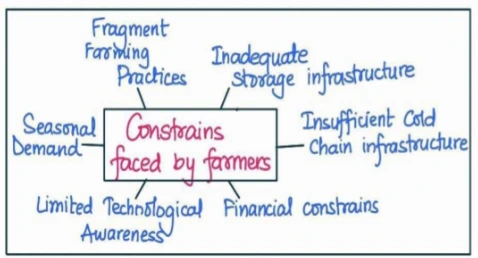Answer:
|
How to approach the question
- Introduction
- Write briefly about the post-harvest infrastructure.
- Body
- Mention the impact of inadequate post-harvest infrastructure regarding the marketing of agricultural produce. Give a few examples.
- Write about various challenges to farmers.
- Give measures or solutions to overcome challenges.
- Conclusion
- Give an appropriate conclusion in this regard.
|
Introduction
According to the Ministry of Food Processing Industries, India loses about USD 14 billion worth of agricultural produce annually due to inadequate post-harvest infrastructure. A study by the Indian Council of Agricultural Research (ICAR) estimated that appropriate post-harvest management practices could help reduce post-harvest losses by 10-15% and increase the income of farmers by 10-20%.
Body
Impact of inadequate post-harvest infrastructure
- Minimising Losses: As per the Ministry of Food Processing Industries (MFPI), India loses about 30% of its total agricultural produce annually due to inadequate storage and transportation facilities. Improved infrastructure can reduce these losses, resulting in increased availability of food and reduced wastage.
- Maintaining Product Quality: High-quality produce fetches better prices in the market. Post- harvest infrastructure, such as packaging units, and processing plants, help maintain the quality and freshness of agricultural produce. Example- It is assumed that Reliance fresh has better storage than a cart hence better quality is expected.
- Extending Shelf Life: Commodities with limited shelf lives, can be extended through appropriate post-harvest infrastructure. Cold storage facilities, controlled atmosphere storage, and refrigerated transport help to prolong the shelf life of produce. This allows farmers to store and sell their products over a more extended period, reducing market pressure and price fluctuations. Example- A cucumber in cold chain will last longer than one which is not.
- Socio-economic Benefits: Proper management of post-harvest systems can serve as a major help in resolving various social and economic issues. A significant decrease in post-harvest loss can alleviate food insecurity all over the world. Example- In FCI warehouse more than 38,000 metric tonnes (MTs) of food grains were damaged since the last five years.
- Value Addition: Processing units for products like fruits, vegetables, grains, and dairy products allow for the production of value-added goods such as juices, jams, pickles, flour, and dairy derivatives. Value-added products often have higher profit margins, leading to increased income for farmers.
- Market Linkages: It provides better market linkages between farmers and consumers. It enables farmers to connect with larger markets beyond their immediate vicinity, providing greater access to buyers, higher demand, and better prices for their produce.
Constraints

- Lack of Adequate Storage Infrastructure: India faces a significant shortage of proper storage infrastructure, especially in rural areas. According to government estimates, the country has a storage capacity of around 120 million metric tonnes, while the requirement is approximately 150 million metric tonnes.
- Insufficient Cold Chain Infrastructure: It is still underdeveloped, with limited coverage and inadequate connectivity.
Example- The Indian cold chain logistics market was valued at $16 million in 2021.
- Financial Constraints: Small and marginal farmers face financial constraints that hinder their access to storage facilities, processing units, and cold chain infrastructure. Example- An average indian farming household earns Rs. 10,000 only.
- Limited Awareness and Technical Knowledge: Farmers in India lack awareness as well as technical knowledge about the benefits and availability of storage facilities, processing units, and cold chain infrastructure.
- Seasonal Demand and Infrastructure Utilization: The agricultural activities are highly seasonal, with peak production and market demand during specific periods. It discourages the permanent infrastructure creation.
- Fragmented Farming Practices: Large number of small and fragmented landholdings make it challenging to aggregate produce and utilize storage and processing facilities efficiently
Measures
- Infrastructure Development: Governments should increase investments and foster public- private partnerships, offering subsidies and incentives to farmers, cooperatives, and private entities for infrastructure establishment and maintenance.
- Awareness and Technical Knowledge: Awareness campaigns to educate farmers about the benefits and utilization, Provide training programs and workshops on proper handling, packaging, processing techniques, and quality control measures, Promote farmer-to-farmer knowledge sharing to disseminate best practices.
- Access to Financial Support: Simplify and expedite procedures for accessing financial support and subsidies, Establish specialized funds or credit facilities with favourable terms for farmers.
- Streamlining Government Support: Ensure timely project approvals and effective implementation of infrastructure development schemes. Simplify administrative procedures and reduce bureaucratic hurdles in availing government support and foster public-private collaborations to leverage industry expertise, technology, and resources in infrastructure initiatives.
Steps Taken:
- Rashtriya Krishi Vikas Yojana-Remunerative Approaches for Agriculture and Allied Sector Rejuvenation (RKVY-RAFTAAR) Scheme with major focus for development of pre & post- harvest infrastructure, besides promoting agri-entrepreneurship and innovations.
- “Agricultural Marketing Infrastructure (AMI)”, which is a sub-scheme of Integrated Scheme for Agricultural Marketing (ISAM), is available to Individual farmers, Group of farmers/growers, registered Farmer Produce Organizations (FPOs) etc.
- Pradhan Mantri Kisan Sampada Yojna (PMKSY) scheme with the objective of creation of modern infrastructure along with efficient supply chain management for the entire processing value chain.
Conclusion:
In a developing country where almost 50% of the workforce is involved in agriculture, Addressing inadequate post-harvest infrastructure is crucial to reducing agricultural losses, improving farmers’ incomes, enhancing food security, and maximizing the potential of India’s agricultural sector.
To get PDF version, Please click on "Print PDF" button.


https://uploads.disquscdn.com/images/fabf3b8e4ede5d8bbaefa41d92abd921f6ac0cc8338aa5756a57c4a0483a1cae.jpg https://uploads.disquscdn.com/images/6df6d7972e56af4e21eb2e084c4797a7cce0b1d2df7edb63d21a363e45538d99.jpg https://uploads.disquscdn.com/images/1b24bee8f05840f44d41e694477dad55a14b69aedf342028f8e974c34815746f.jpg
https://uploads.disquscdn.com/images/a86f87f458c7f516c8f874497ffb31276f3df07e3ebe0c9fd22e9c2899be8267.jpg https://uploads.disquscdn.com/images/3fbcb34005be56b48309ed229f879d2669e71dca8719fadd0fd397f38394c279.jpg